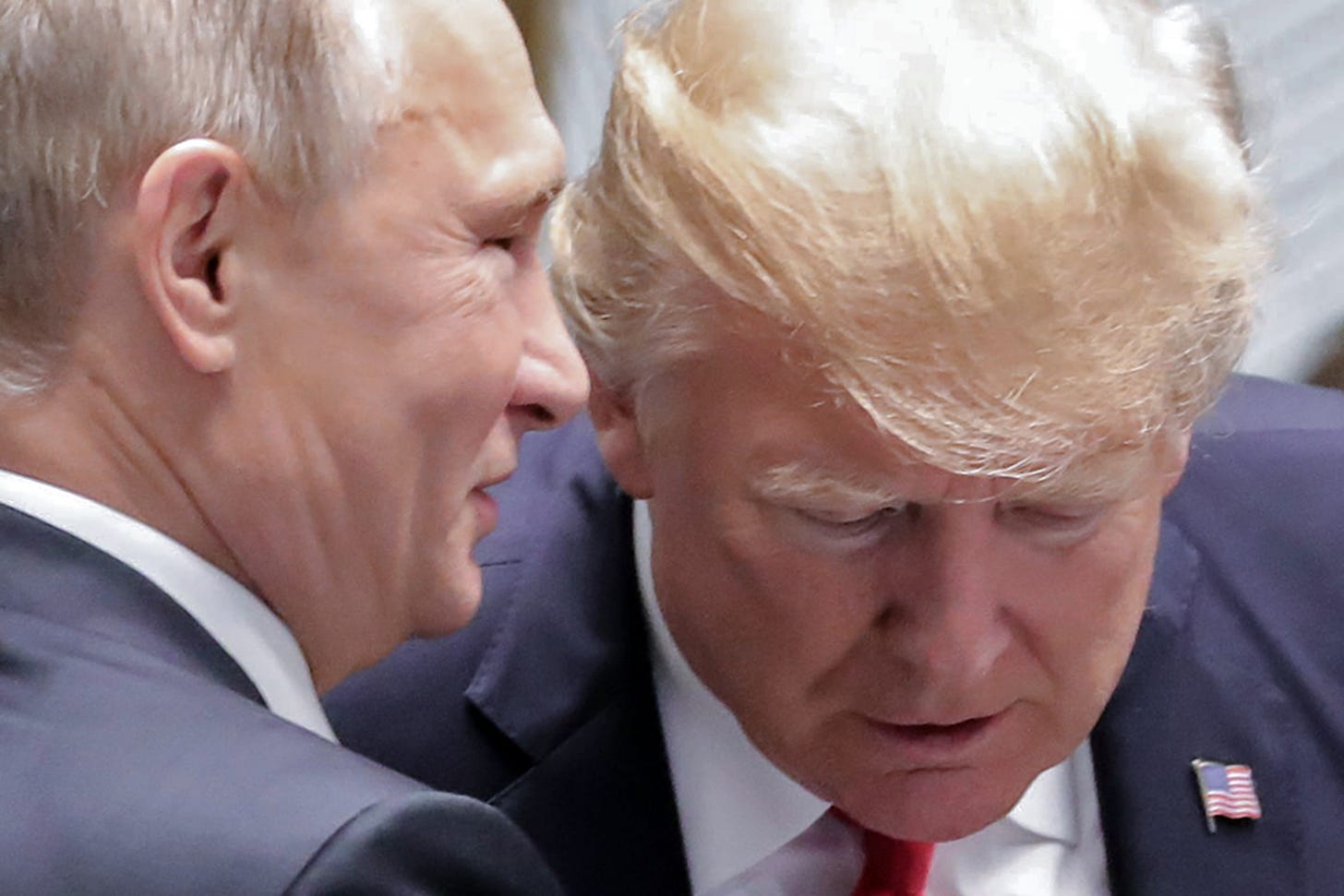
(Russian President Vladimir Putin and US President Donald Trump talk as they attend the Asia-Pacific Economic Cooperation (APEC) leaders' summit in the central Vietnamese city of Danang on November 11, 2017. Photo by Mikhail Klimentyev/AFP, via Getty Images.)
The Republican controlled Senate Intelligence Committee released a massive report on Aug. 18 that not only confirmed the conclusions detailed by Special Counsel Robert Mueller, it went on to describe how Trump campaign advisers worked with Kremlin officials, intelligence officers and others tied directly to Russian spies.
The report dispelled previous attempts by Trump allies to undermine the work of Robert Mueller and his team, and provided a bipartisan Senate certification for an indisputable truth: The Russian government interfered in an American election to assist Trump with becoming president. Intel confirms that Russian intelligence viewed members of the Trump campaign as easily manipulated, and relied on the eagerness expressed by Trump’s advisors for the help. The report described members of the Trump Campaign as: “attractive targets for foreign influence, creating notable counterintelligence vulnerabilities.”
Further, the report confirmed extensive evidence that the Trump campaign had contact with people tied to the Kremlin. Paul Manafort, Trump’s former campaign chairman who also managed the Trump Campaign for several months in the summer of 2016, had a longstanding association with Konstantin V. Kilimnik, whom the report identified as a “Russian intelligence officer.”
This bi-partisan intel report is certainly not new, but is important given the recent string of events that have followed since its release in mid-August. On Aug. 29, just a few weeks after the release of information confirming the extent of Russia’s involvement in the 2016 election, the Office of the Director of National Intelligence (ODNI) sent a letter to the House and Senate Select Committees on Intelligence advising that there would no longer be in-person briefings about election security and foreign election interference.
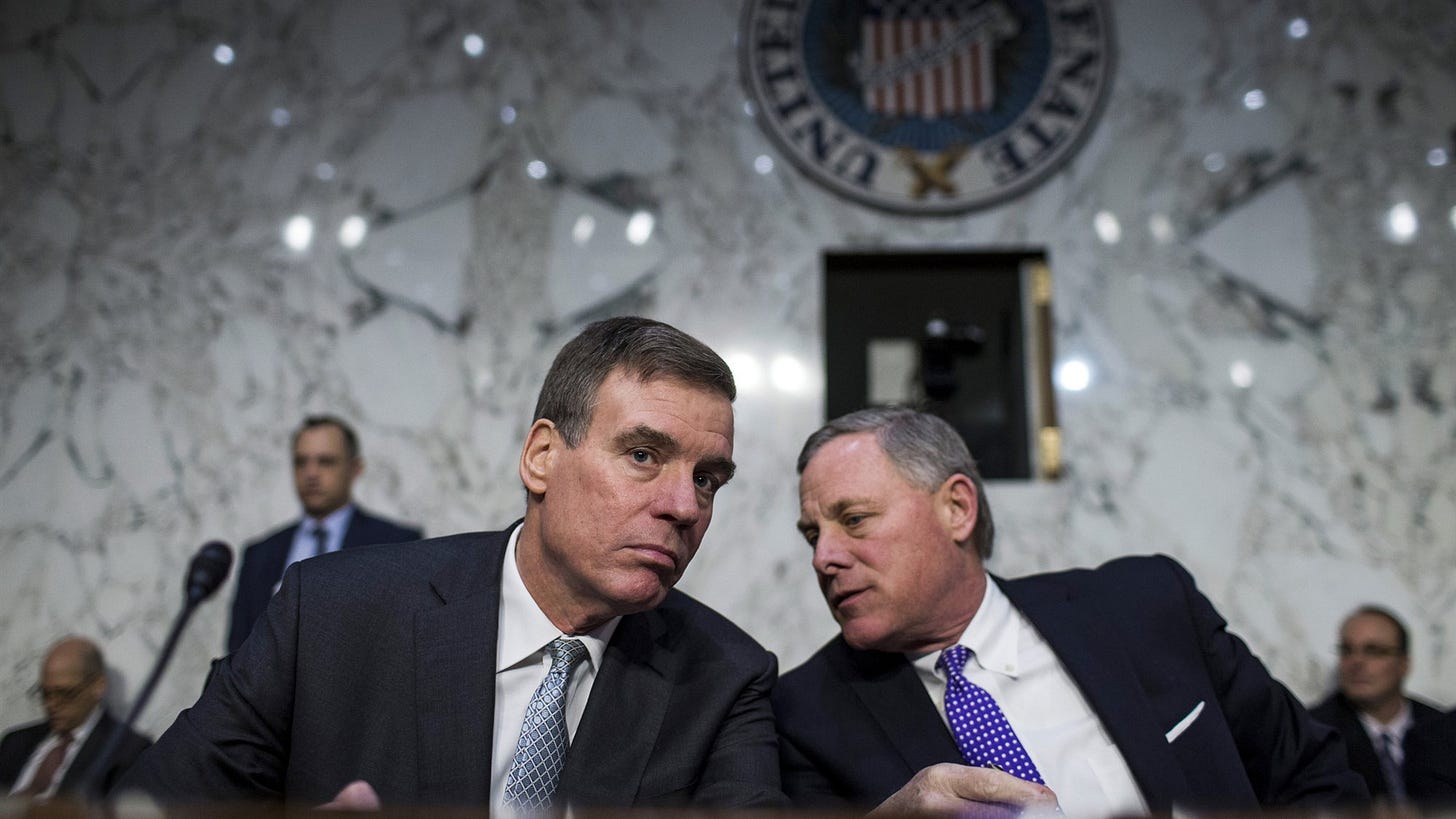
(Ranking member of the Senate Intelligence Committee Senator Mark Warner (D-VA), left, and Committee Chairman Senator Richard Burr (R-NC) speak before the start of a hearing on worldwide threats in Washington on Feb. 13, 2018. Photo by Zach Gibson/Bloomberg, via Getty Images.)
Director of National Intelligence (DNI) John Ratcliffe confirmed that the ODNI would also be cancelling briefings that had already been scheduled for members of the House Intelligence Committee on election security in mid-September. Speaker Nancy Pelosi and Rep. Adam Schiff called the decision “a shocking abdication of its lawful responsibility to keep the Congress currently informed, and a betrayal of the public's right to know how foreign powers are trying to subvert our democracy.”
One of the underlying reasons that was floated in the press for the change in briefings was the notion that intelligence leaks following briefings to Congress continued to occur and DNI Ratcliffe was trying to send a message. An excuse that the committees will still have access to written finished intelligence reports was also offered up, but the committee would no longer have the ability to ask questions of officials regarding the information they were given.
There was also no explanation as to why the ODNI suddenly thought it was a good idea to keep Congress less informed on Russia’s ongoing election interference, just three months out from another presidential election, following the release of such a monumental report confirming Trump’s Russian entanglements. It’s also worth noting that Ratcliffe has always been a Trump loyalist and was a former House Republican who defended against former special counsel Robert Mueller’s report on Russian interference in the 2016 election.
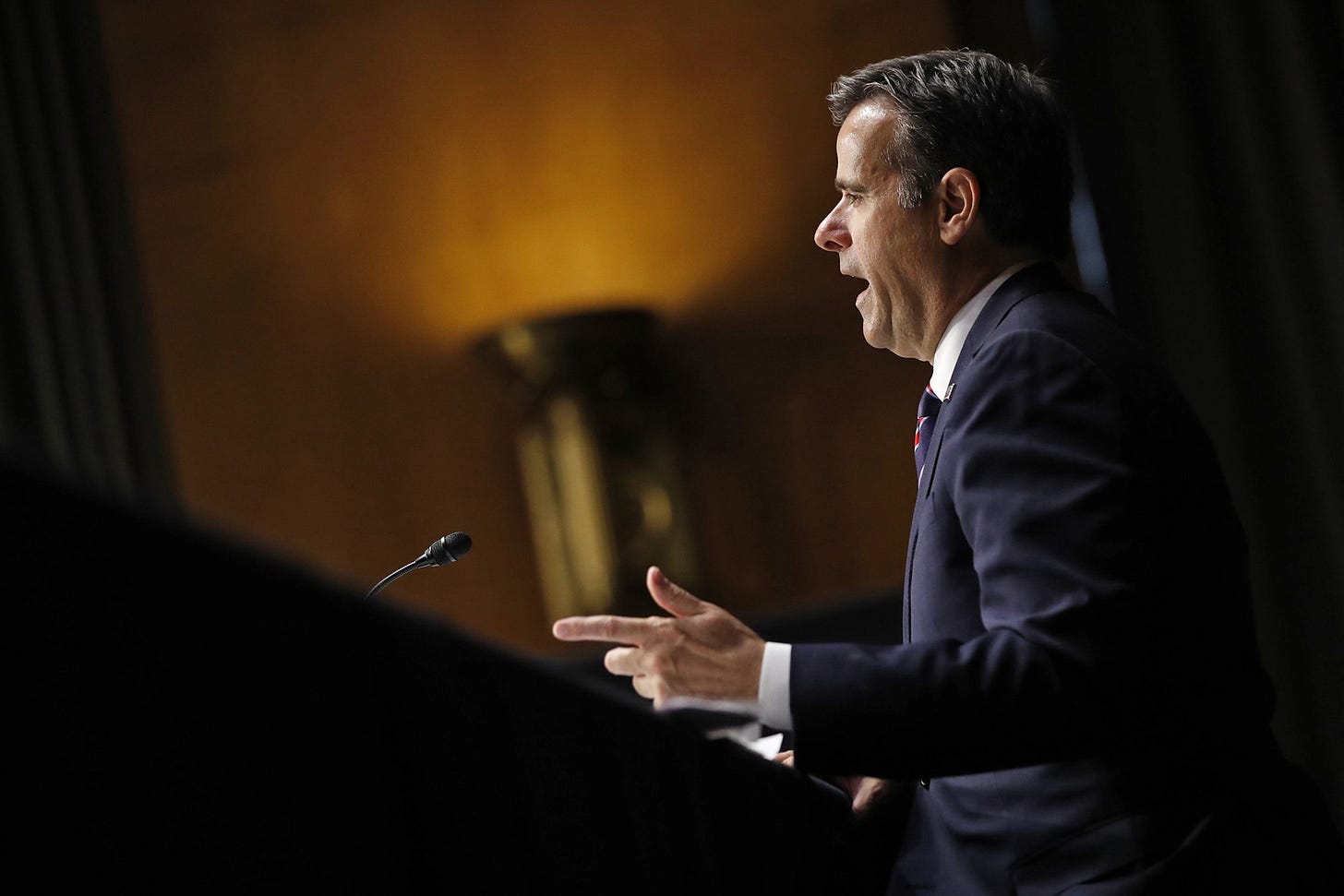
(Rep. John Ratcliffe (R-TX) answers questions from a Senate Intelligence Committee during his hearing to be confirmed as Director of National Intelligence on Capitol Hill on May 5, 2020. Photo by Andrew Harnik, via Getty Images.)
Despite having no real intelligence experience and being completely unqualified, Ratcliffe was first nominated for intelligence chief last year after the resignation of Dan Coats, who repeatedly clashed with Trump on national security issues. At the time of his nomination, many speculated that his appointment was to provide cover for Trump with regard to Russian assistance, and that he would be expected to squash further reporting by the intelligence community about Russian interference in this year’s election.
It was also reported this week that in early July, the Department of Homeland Security (DHS) withheld publication of an intelligence bulletin warning law enforcement agencies of a Russian election interference scheme to promote false “allegations about the poor mental health” of Democratic Nominee Joe Biden. The draft bulletin, titled “Russia Likely to Denigrate Health of US Candidates to Influence 2020 Election,” was submitted to the agency’s legislative and public affairs office for review on July 7, but was stopped from being distributed to federal, state and local law enforcement partners merely hours after being delivered.
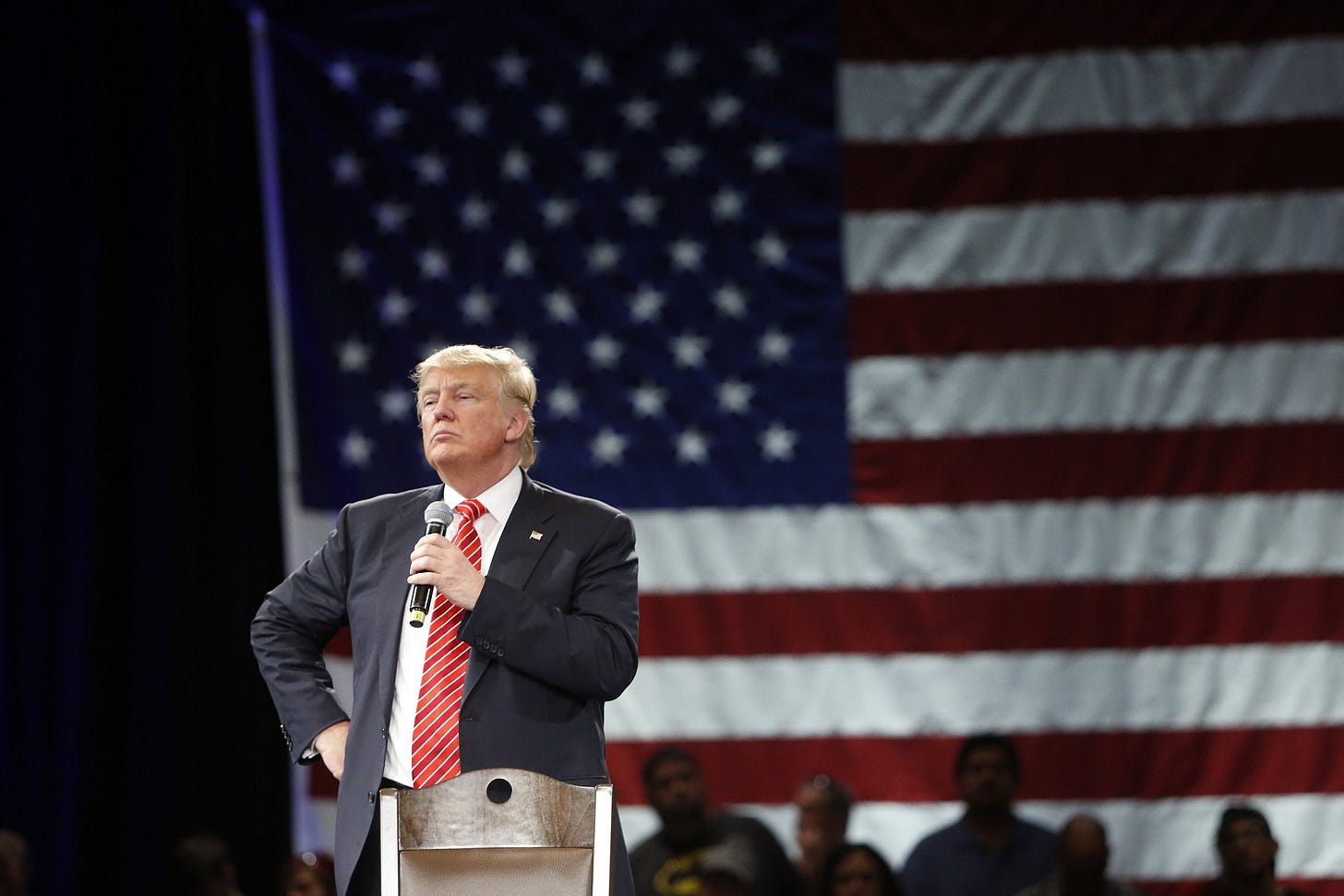
(Donald Trump speaks to supporters during a town hall meeting on March 14, 2016, at the Tampa Convention Center in Florida, a time when his campaign was in contact with Russian operatives according to the recent Senate Intel Report. Photo by Brian Blanco, via Getty Images.)
Analysts determined in the bulletin, with “high confidence,” that “Russian malign influence actors are likely to continue denigrating presidential candidates through allegations of poor mental or physical health to influence the outcome of the 2020 election.” This strategy closely mirrors the one currently being deployed across social media, in attack ads and at rallies by Donald Trump in his bid to win re-election.
Additionally, it was confirmed this week that Peace Data, the Russian group that interfered in the 2016 presidential election, is actively working a Russian political influence campaign targeting left-wing voters in the United States, Britain and other countries. The group is using a network of fake accounts and a website set up to look like a left-wing news site.
They actively recruited English-based freelance journalists, in desperate need of work during the pandemic, to write articles about topics including the US presidential election, the coronavirus pandemic and alleged Western war crimes in order to help sow discord. What is perhaps more concerning than the level of sophistication that Russia has developed with regard to their online subterfuge tactics, is that the actual reporting of the disinformation campaign came from Twitter and Facebook, not from the ODNI or other American-based intelligence agencies.
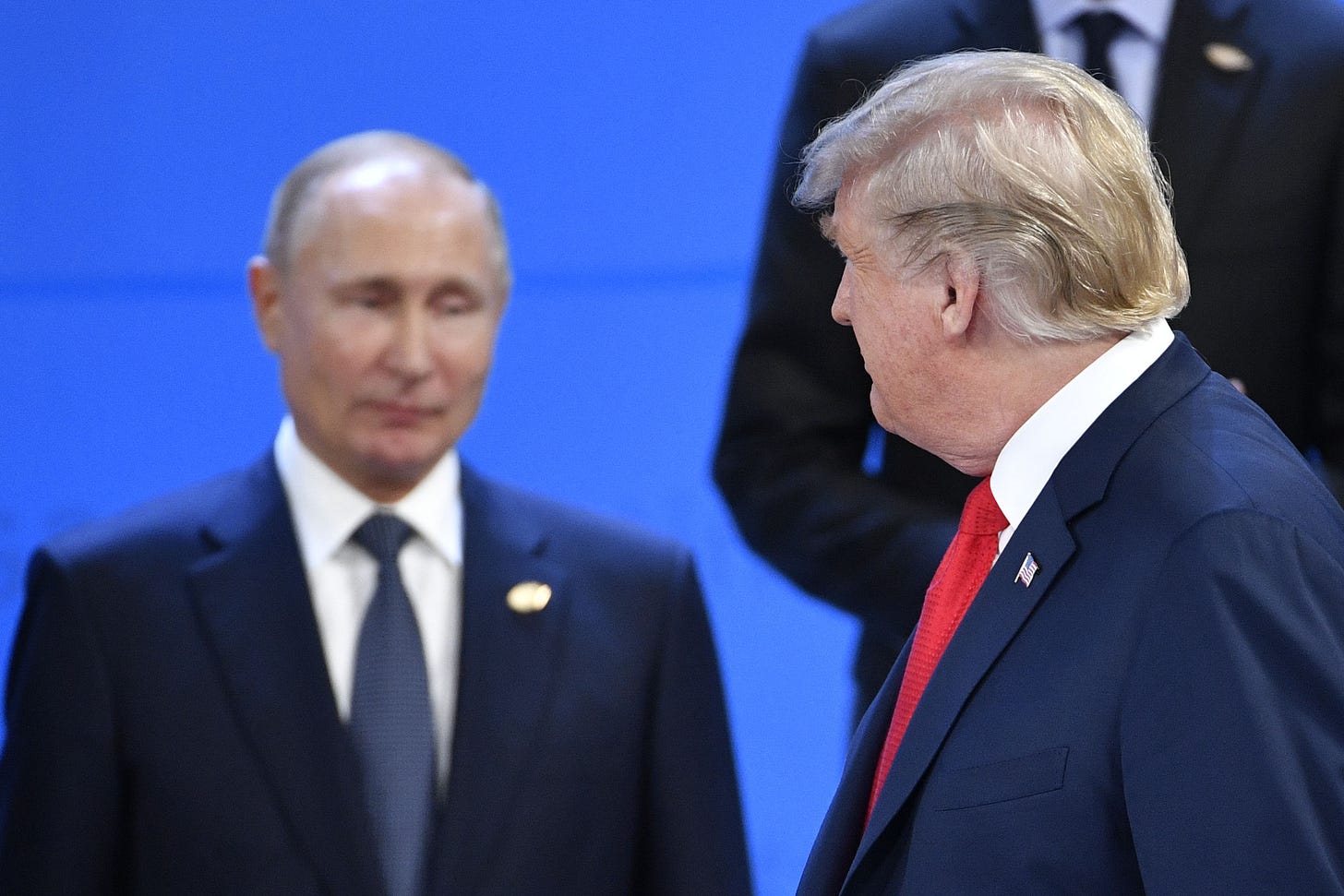
(Trump looks at Russia's President Vladimir Putin as they take their places for a family photo, during the G20 Leaders' Summit in Buenos Aires, on November 30, 2018. Photo by Alexander Nemenov/AFP, via Getty Images.)
All of these factors are concerning on their own, and might be easy to overlook given the constant barrage of information concerning election security in the United States. But, when taken together, and assessed from the perspective that the ODNI is assigned to the task of gathering and reporting election security intel rather than attempting to suppress it, you start to see a common link.
Republicans confirmed in August that Russia undoubtedly interfered in the 2016 election and used the Trump Campaign to do it. The stakes for Donald Trump maintaining his grip on American power are even higher, both for Trump and for Russia. Any normal administration who was intent on providing unbiased election security during this time would reasonably make more of an effort to guard against further foreign intervention out of an overabundance of caution and for the appearance of neutrality. Trump has taken the lead from Putin yet again, and is not even bothering with the pretense of appearing to be impartial.
Your paid subscriptions allow me to keep publishing critical and informative work that is sometimes made available to the public — thank you. If you like this piece and you want to further support independent journalism, you can forward this article to others, get a paid subscription if you don’t already have one or send a gift subscription to someone else today.
Amee Vanderpool writes the SHERO Newsletter and is an attorney, published author, contributor to newspapers and magazines and analyst for BBC radio. She can be reached at avanderpool@gmail.com or follow her on Twitter @girlsreallyrule.




Good read, Amee. Very informative.
I've become completely certain that nothing--absolutely nothing--will dissuade a Trump voter from supporting their Dear Leader. There could be video of him handing the nuclear launch codes over to Putin and they would just deny that it's real.